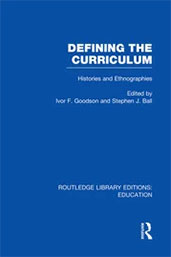Defining the Curriculum: histories and ethnographies
Subjects for Study: towards a social history of curriculum
Subject Coalitions in Evolution: Internal Curriculum Change
In the subjects studied (further work is of course needed), a pattern of evolution can be discerned in the process of becoming a subject. Initially a subject is a very loose amalgamation of sub-groups and even idiosyncratic versions, often focussed on pedagogic and utilitarian concerns. A sub-group emerges arguing for the subject to become an academic discipline so as to be able to claim resources and status. At the point of conflict between earlier sub-groups and the proselytizing 'academic' sub-group, a subject association is often formed. The association increasingly acts to unify sub-groups into a dominant coalition promoting academic status. The dominant coalition calls for discipline status and for university departments to be set up to train its disciplinary specialists (see MacKinder's manifesto). Some subjects (for example, rural/environmental studies) are blocked at this point (university admissions policies play a role here).
For the successful subjects a final stage is the creation of a university discipline base. The subject is now defined increasingly by university scholars and it is to the structure of their material interests and resulting aspirational patterns that we must look to explain curriculum change (for example, new geography, molecular biology) and any resultant tensions for the school subject.
Changing Climates and External Relations: Defining a New Subject
The emergence of the environmental climate of opinion offered new opportunities for subject groups and sub-groups in the promotion of their interests. (I have not dealt with the structural origins of this new climate as other work has attempted this. For example, 'the climate of opinion which made environmental studies a credible label for curriculum innovation in the '60s and '70s is best understood in terms of the historical circumstances of post-war capitalism', Gomm, 1977.)
In this respect Ben-David and Collins' hypotheses were substantially proven. They argued that for a new subject or discipline:
- the ideas necessary for creation are usually available over a relatively prolonged period of time and in several places;
- only a few of these potential beginnings lead to further growth;
- such growth occurs where and when persons become interested in the new idea, not only as intellectual content but also as a potential means of establishing a new intellectual identity and particularly a new occupational role.
They conclude: 'the conditions under which such interest arises can be identified and used as a basis for eventually building a predictive theory' (Ben-David and Collins, 1966, p. 452).
